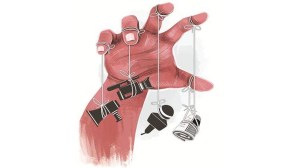Software parks leave dotcom blues behind
After two apprehensive years following the dot-com bust, software and service exports from the Software Technology Parks of India STPI are...

After two apprehensive years following the dot-com bust, software and service exports from the Software Technology Parks of India STPI are plugging up the growth path, thanks to the outsourcing phenomenon.
According to a performance review conducted last week by the Department of Information Technology in consultation with state governments and industry associations, software exports from the ten STPs have grown 30 per cent over April-December 2003.
Software and service exports from the STPIs grew 36 per cent in 2002-03 though their overall share in exports declined marginally from around 81 per cent in 2001-02 to slightly under 80 per cent in 2002-03.
During the lat two years, a senior Department of IT official said, more than 1,000 STPI-based units shut shop.
Officials said that though the last quarter of 2003-04 January-March may reverse the current positive scenario and bring the performance of STPIs back to 2002-03 levels, the re-orientation and restructuring of the last two years will eventually bear positive results. For instance, currently nearly 6,000 firms operate in all the STPI locations. There were only 3,500 in 2002-03.
8220;Many companies in the software parks were set up during the dot-com days and they went bust. Others had to be shut down because they were not functioning. The growth we8217;re now seeing is because of the BPO business,8221; the official said.
Around 1,800 units were removed from STPIs during the restructuring process over 2001 and 2002. 8220;Removal was based on identification of non-functional units, while many of the firms closed on their own steam,8221; an official said.
STPIs owe most of their growth to the most active centres in NOIDA, Hyderabad, Bangalore, Chennai and Mumbai, followed by Pune, Thiruvananthapuram, Gandhinagar, Kolkata and Bhubhaneshwar. In terms of states, Karnataka, Tamil Nadu, Maharashtra and Andhra Pradesh posted maximum exports.
Despite the high growth expected to be reported over financial year 2003-04, the government is going easy on expanding STPI locations. Requests from far-flung states like Jammu and Kashmir and the North East region keep coming in, but the focus was currently to 8220;energise and improve the existing centres rather than going into heedless expansion.8221;
8220;There is already a lot of competition among service providers, whose revenues are under pressure from the lowering of tariffs, we therefore encourage STPI units to branch into consultancy and other services that can yield revenues too,8221; he said.
Apart from providing infrastructure and bandwidth to exporting firms, the STPIs also offer consultancy and business development assistance to their units.
STPI-based firms constituted nearly 80 per cent of the software industry8217;s exports in 2002-03, amounting to software exports worth around Rs 37,176 crore. A repeat of this performance is expected in 2003-04 as well.
- 01
- 02
- 03
- 04
- 05































